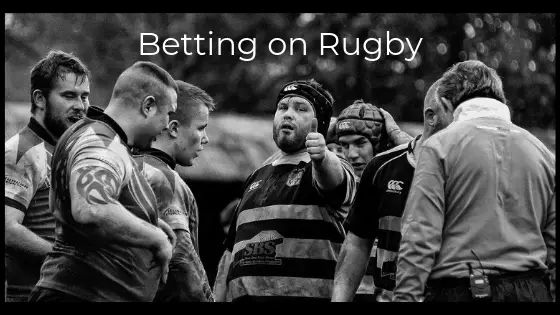Rugby Union, “the game they play in heaven” is heaven on Earth for sports bettors! Played on every inhabited continent on Earth in high profile professional domestic leagues and in prestigious International competitions between nations. Its pinnacle event, played every four years, is the Men’s Rugby World Cup, the third largest sporting tournament in the world behind the Men’s FIFA World Cup and the Summer Olympics Games. Rugby Union features some of the most powerful and dynamic athletes in the world. Their stage is a brutal, take no prisoners arena, where winning requires equal doses of skill and courage. All with no pads!
Rugby Union, affectionately known around the world as ‘Rugby’ is steeped in tradition. According to popular legend, in 1823 a young student at Rugby School in the English University town of the same name, William Webb Ellis, invented the game when he scooped up the ball and ran with it during a soccer match. In honor of this young trailblazer, the coveted Rugby World Cup Trophy is named in his honor and players from across the world shed immeasurable blood sweat and tears in pursuit of that piece of silverware.
Betting on Rugby is not as brutal, in fact with some basic understanding of the game, getting action on Rugby is quite simple. All leading sportsbooks offer odds on International and the Major Domestic Leagues.
Before you start betting check out our sign up bonuses with PointsBet and UniBet. Kick off your rugby betting experience with a few free swings!
How Does the Game of Rugby Union Work?
Watch this short video for a crash course in the rules of the game.
Popular Rugby Union Betting Markets
Head to Head (Moneyline)
The phrase head to head is used by European and Australasian bettors but it simply means the moneyline. This is the simplest form of betting as you only need to pick the outright winner. In domestic leagues the moneyline acts much like it does in the NFL. With salary caps employed, most domestic leagues are fairly even and picking winners will ensure you grab some value without looking too hard.
The Takeaway: If you truly want to find value in domestic rugby use two basic rules of thumb. In the early part of the season look for underdogs as there is no established form line and later in the season look at a team’s points for and against differential. A solid positive for and against is an indicator of a consistent team who will be in most games late.
The International game is a much different proposition. There are no salary caps or drafts, players quite obviously just need to be from that nation to play for them. What this leads to are some very short priced favorites in international rugby. Teams like the great New Zealand All Blacks, South Africa, Australia, Wales, Ireland and England are perennially strong. When they come up against another lesser quality rugby nation, there is limited value for the bettor in taking them at the moneyline. When they play each other, then it is game on.
Also take note, Rugby is very traditional, for most matches played outside of World Cup knock-outs or domestic league playoffs, no extra time is played. Teams just share the honors. Consider this fact when placing Moneyline bets and check closely whether your sportsbook offers the tie/draw or simply invokes the dead heat rule.
The Takeaway: In the early stages of large tournaments like the World Cup the powerhouses are ridiculously short. Perhaps the better approach here would be to parlay some of the favorites but even then the value is scarce. In non- tournament play, look at home underdogs. It doesn’t matter how big and powerful you are, playing in a hostile stadium on the other side of the world is daunting and on field ambushes are likely.
Note the one-sided nature of the above World Cup group game. Powerhouses England, clear moneyline and point spread favorites, over the pacific island nation of Tonga. This example is taken from the DraftKings Sportsbook and they don’t offer a draw/tie option. In the unlikely case of this match being a draw, the dead heat rule would apply. Bettors would be awarded half odds. Not great it you have England, but still a profit if you were on Tonga.
For an on point rundown of how to bet the Rugby Moneyline check out our article here.
Point Spread
The point spread is a hugely popular rugby union betting market. Particularly in the early stages of big tournaments like the World Cup where moneyline markets can be quite one sided.
The point spread evens out the contest by handicapping the favorite.
The maximum points scored in one play is 7 from a “converted try”. Often spreads are set at +/- 7.5, +/-14.5 or even +/-21.5 for potentially lopsided games to reflect multiples of converted trys.
Three point penalty goals add another factor into the point spread. The flipside of this is the uncertainty of post try two point conversions which miss about 20% – 25% of the time.
Obviously betting the point spread takes “Draw” out of the equation as most times sportsbooks will use the half point or hook to ensure a winner is decided. This can be very handy if teams are evenly placed on the moneyline market as the half point can make all the difference!
The Takeaway: Despite the variance in scoring there are significant point spread numbers in rugby. 3, 5, 7, 10, 12, and 14 are all key threshold points when betting the spread. Shop around to find a number that is above or below these thresholds, depending on your slant.
The example above shows the variance in point spread and moneyline markets. Note the -9.5 point spread on New Zealand means they need to win by a converted try and a penalty goal. Instead of the number being moved to 10 or 10.5, a significant number, it has remained at 9.5 and the price has altered from the -110.
Over/Under Points Total
The Over/Under points total is a popular bet with Rugby fans. Virtually all sportsbooks offer this type of bet on big games. There are quite a few components of the game that influence the level of scoring in professional rugby.
Weather plays a huge part in determining the openness of the game. Wet and slippery conditions turn the game into an up the middle, ‘bash em up’, field position battle. This nullifies attacking weapons and becomes a low scoring affair.
Under clear skies teams can play ‘running rugby’ where the ball is promoted out wide to the fast back line players and trys become more regular.
The Takeaway: When running rugby is the order of the day, points totals close to a point a minute are quite regular ie 70 – 80 points in the match.
Rugby has a lot of set piece (set plays) as there are regular stoppages like scrums and lineouts. This gives teams a chance to set up the way they like. Teams that are strong at set pieces often leverage that to gain field position and ultimately score. They simply roll over the top of their opponents. This in turn makes it difficult for the opponent to score.
The Takeaway: In situations like this focus on the over for the set piece dominant team, particularly look at second half totals where the dominance pays off.
Want to become a rugby totals betting king!? Our article on betting the over under has you covered.
Attacking teams might be good at scoring points, but can be more prone to leaking points too. As rugby is a high turnover of possession sport taking risks to score means at times you pay the price. Some teams prefer a shootout instead of the grind. If two of those teams are matched up then the points will flow.
Some years ago rugby had begun to lose some of its attacking flair. In an effort to open the game up many domestic competitions (and some international ones) began implementing a bonus point system. Bonus points are awarded for in game scoring achievements like 4 or more trys (even if the team loses!!). The incentive is bonus points are added to the overall standings.
The Takeaway: Over the season it pays off to play attacking rugby. Look out for teams chasing the fourth try. They won’t put the cue in the rack. This can push points totals over.
A huge component of scoring rate in rugby is the goal kicking (think NFL field goal kicker only better). A penalty goal is worth three points and the conversion kick after a try (think extra point) is actually worth two points. The goal kicker also has to take the conversion kick in line with where the ball was placed down for the try. Often this is wide out near the sideline.
Goal kickers also comfortably kick from 45m – 50m plus. Thats close to 60 yards! With the field only 50m long it’s not unheard of for a kicker to take a shot from just inside their own half!
The Takeaway: . What makes Rugby union unique is the importance goal kicking. Do your research. An exceptional kicker 85% plus strike rate will win you games and push points totals up!

Double Result (Halftime-Fulltime)
The Double Result is a super popular market for Rugby fans interested in building a two leg parlay in the one match. It puts the team leading at halftime and then at full time in the same bet, giving fans 4 options to bet on. Raging hot favorites are slightly longer odds to be winning at half and full time than if you just them on the moneyline. This is attractive for bettors chasing a little bit more return.
The option of either team leading at half time and then the other team leading at fulltime offers a juicy reward. Clearly lead changes can occur but this is high risk.
Likewise the “draw at either half-time or full time” can be an option in this bet type and again is risky but rewarding.
The Takeaway: You may not use the halftime/full-time option all the time but be opportunistic. With Rugby being such a territory/kicking based game. Check out the prevailing wind conditions. Take the team with the strong wind in the first half to lead, then the team with the wind in the 2nd half to snatch the lead by full time. The juicy odds may be something different to your usual type of betting so choose your stake accordingly.
Margin
Margin betting is a favorite for more experienced rugby bettors. Quite simply, five options are provided:
- Team A wins by a margin of either 1-13 or 14+,
- Team B wins by a margin of 1-13 or 14+,
- or the game ends in a draw.
The key to this type of betting is 14+ is the same as 2 converted tries. So consider this when placing this type of bet. Teams chasing (or defending) their “For-Against” in tournaments may not take the foot off the pedal and these types of bets can be used very successfully by the aware bettor.
Likewise in tournament knock-out matches or playoffs, teams can throw caution to the wind and start to leak points late.
The Takeaway: This feature often comes with a “CASH-OUT” function. If you have taken a longer shot in the margin markets you be offered a decent cash out figure and you can lock in the profit.
In the above example the margin betting odds can be seen in decimal odds format. As New Zealand are clear favorites to win outright, they are heavily favored in the margin bets also. In fact the most favored result is a New Zealand win by 13+ points.
First Try Scorer Market
If money line and point spread isn’t offering the high reward you are after, consider placing a bet on the “First Try Scorer” market. As its name suggests this market calls on bettors to select the player to score the first try of the game. It is also possible to wager on the first try scorer for each team.
These markets tend to favor the speedy back line players (wingers and fullback) who are on the end of set plays or line breaks. They enjoy the luxury of some open space being created from crafty set plays and have speed to burn off defenders. The odds however tend to be too short on the wingers and fullback.
While this market is somewhat of a lottery there is always some value floating around.
The Takeaway: In dry conditions look for the wingers to score the first try but be aware there is limited value. Sometimes a powerfully running flanker off a set piece scrum play is a value bet. Also look for first try scorer promotions that offer “cash-back” or “Bonus bets”. These may be hard to find at US sportsbooks but could appear around World Cup time.
The Intangibles
A Quality Goal-Kicker is Priceless
The “Goal-Kicker” is a highly skilled athlete who, unlike an NFL kicker, has to also be an on field player. They cannot be substituted on just to kick for goal. As a result of being involved in general play they are often in the line of fire. When their team needs them they need to step up and capitalize on the scoring opportunities, regardless of fatigue or injury. It is their job to make the most of field position and convert that to points.
Some basics on the international standard kickers;
- Nowadays players are making penalty shots on goal from 60, even 70 yards out.
- For trys scored near the sideline, the conversation kick is taken from the sideline so the angle is tighter.
- Teams can often win by just kicking penalties and not scoring any tries at all. This famously occurred in the 1995 World Cup Final in Johannesburg.
- The best in the world have a success rate of over 88%.
An 88% success rate is out of sight, some NBA players would be wrapped with that sort of form from the free-throw line!!
The Takeaway: The secret here is, check the quality of the kicker before hand. In close moneyline matches the team with the better kicker is a reliable choice. Having a clutch goal kicker has won weaker teams World Cups before. Like England in 2003, whose goal kicker Johnny Wilkinson famously practiced his goal kicking on Christmas morning.
BONUS LIVE BETTING ALERT: If the number one goal kicker goes down injured during the game, the live odds will change immediately and could even be suspended for a period of time whilst a new market is framed. It’s useful to know if the team has a decent back up goal kicker.
International Rugby is Never Friendly
In the modern world of professional full time athletes, the concept of “rotation policies” and/or “player management” doesn’t really exist in international rugby.
Internationals are brutal contests played with the highest level of impact and no punches are pulled. The honor of representing your nation is immense. These are pure conditions for a bettor because they know pre-match and even pre-tournament research should pay off. Coaches and selectors very rarely do not field any thing but a full strength team of fit players for international matches.
Each major rugby playing nation plays around 10 international games (or less) spread across a calendar year (with the exception of World Cups years). There is no point in resting players for “future matches” because each match, each ruck, each tackle, right there and then is all that matters.
The Takeaway: Planning, simulation of results and possible same game parlays are possible all year round knowing that teams are usually always full strength. This ‘sure footing’ is a God send for bettors.
The Substitution Rule
Rugby, much like the sport it supposedly evolved from, soccer has a substitution rule and not interchange. This means once a player exits the game they cannot return. In physical match-ups, the war of attrition can mean that the powerhouse forwards who do all the grunt work in the middle of the field need to be substituted during the second half. Bench depth is crucial.
With rugby’s global appeal matches are played in all conditions. One match may be in the horizontal rain and cold of Dublin Ireland and next minute players may be sweating it out in the humidity of Suva, Fiji. 60 minutes into a game in the tropics against the Flying Fijians and normally rock solid forwards are waving to the bench for a rest.
The Takeaway: If a team loses a backline player (winger, centre or fullback) to injury mid game, they may not have factored in the need for a substitution. This will mean one less replacement for the forwards. That could make all the difference in a close encounter.
The Rugby Betting Schedule
Major International Tournaments
| Tournament | Participants | Time |
| Rugby World Cup | All qualifying teams | Every Four Years:
Japan 2019 France 2023 TBA 2027 |
| Six Nations Championship | England, Ireland, Scotland, Wales, France, Italy | Annually February and March |
| The Rugby Championship | Australia, New Zealand, South Africa, Argentina. | Annually in July and August |
| International Tours | All major country’s tour the opposite hemisphere for one off games. | July – November |
Major Domestic Tournaments
| Tournament | Participants | Time |
| Super Rugby | Provincial teams from South Africa, Australia, Japan, New Zealand, Argentina | Annually February – July |
| European Rugby Champions Cup | Best Domestic teams from Countries involved in Six Nation Championship | Annually October – May |
What About Rugby 7s
In an effort to reach out to broader markets the International Rugby Board (IRB) have spent the last decade or more developing the World Rugby Sevens format. An annual series of Rugby sevens tournaments that are played across the world, including in the Nevada desert city of Las Vegas. Rugby Sevens gets its name from the fact it is an abbreviated format that only includes 7 players per side on the field & just 7 minute halves. It is fast, fun and made for TV.
This game has gathered appeal in less traditional rugby playing countries and its inclusion in the Olympic Games schedule has meant it will continue to grow.
The seven a side game and the betting that comes along with it, is worthy of its own article. Watch this space as School Of Bets will bring this to you shortly.
Before you start betting check out our sign up bonuses with PointsBet and UniBet. Kick off your rugby betting experience with a few free swings!
The Game Starts Now!
Betting on Rugby is fun and fulfilling. Add this to your sports betting repertoire. The upside is huge! As sports betting gathers momentum, the availability of Rugby markets will too. Become an early adopter. Your account balance may just thank you for it!




